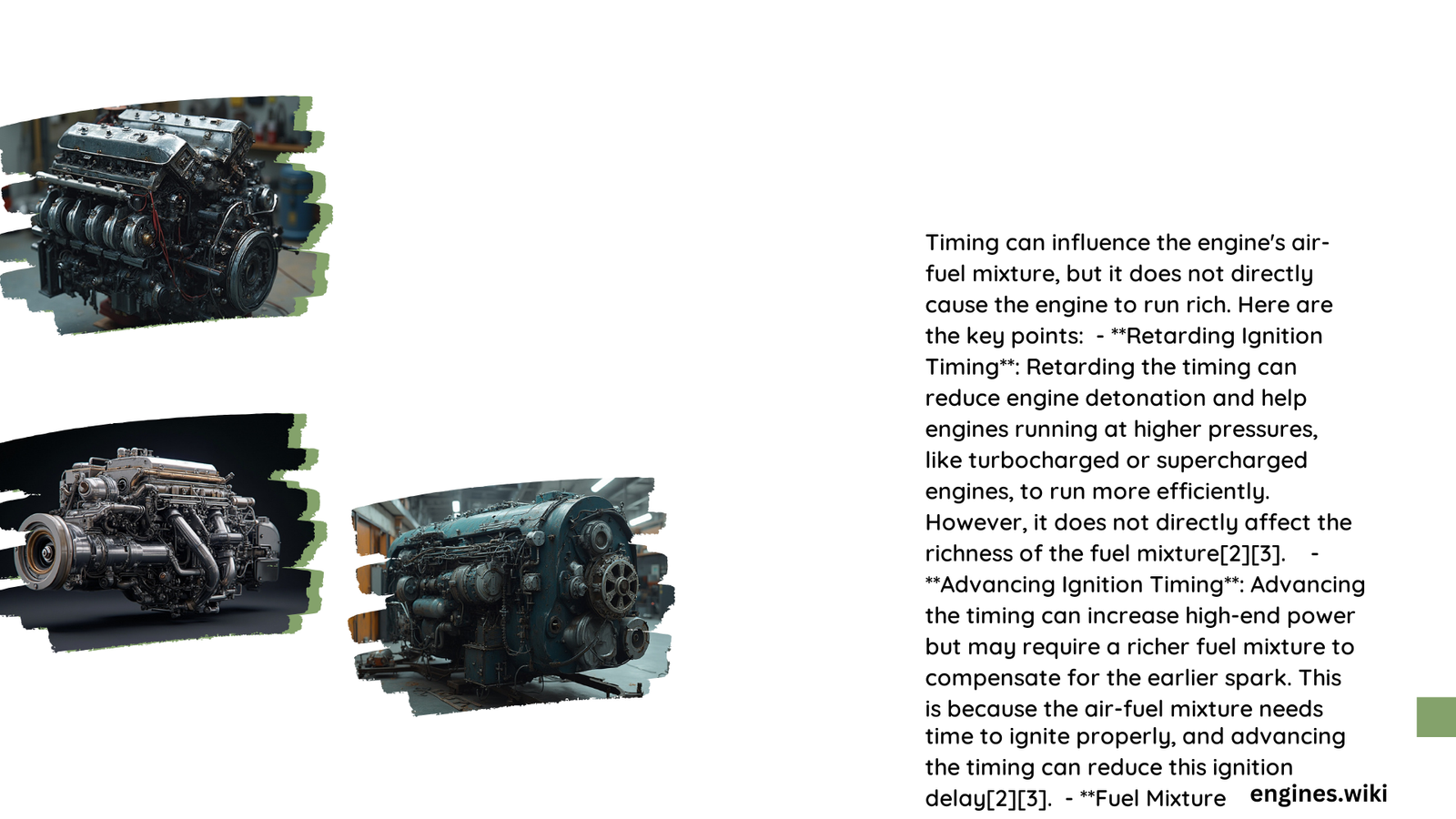Engine timing and its potential to cause a rich fuel mixture is a complex automotive topic that demands precise understanding. While many vehicle owners believe timing adjustments directly impact fuel richness, scientific and technical evidence suggests a more nuanced relationship. Understanding the intricate dynamics between ignition timing, air-fuel ratio, and engine performance requires a comprehensive exploration of mechanical and computational factors that influence engine operation.
What Determines Engine Fuel Mixture?
Engine fuel mixture is primarily controlled by several critical components:
- Fuel Injection System
- Precisely meters fuel quantity
- Monitors air intake volume
-
Calculates optimal air-fuel ratio
-
Engine Control Unit (ECU)
- Manages fuel delivery algorithms
- Adjusts mixture based on multiple sensors
- Maintains stoichiometric balance
Can Incorrect Timing Influence Fuel Richness?
While timing itself doesn’t directly cause rich running conditions, it can indirectly contribute to fuel mixture complications:
| Timing Scenario | Potential Impact | Fuel Mixture Effect |
|---|---|---|
| Extremely Advanced | Incomplete Combustion | Potential Unburned Fuel |
| Significantly Retarded | Reduced Combustion Efficiency | Possible Fuel Waste |
Why Timing Doesn’t Directly Cause Rich Conditions

Fundamental Mechanism of Air-Fuel Ratio
The air-fuel ratio is determined before the ignition event occurs. Key points include:
- Intake Valve Closure: AFR is established when intake valves close
- Spark Timing: Occurs after mixture preparation
- Stoichiometric Ratio: Remains constant at 14.7:1 for gasoline engines
Factors Actually Causing Rich Running Conditions
Several genuine reasons can lead to rich fuel mixture:
- Faulty Oxygen Sensors
- Sends incorrect feedback to ECU
-
Causes persistent rich compensation
-
Malfunctioning Mass Airflow Sensor
- Inaccurate air volume measurement
-
Triggers excessive fuel delivery
-
Coolant Temperature Sensor Issues
- Misreports engine temperature
- Forces richer cold-start mixtures
Diagnostic Approach to Rich Running Problems
Recommended Troubleshooting Steps
- Perform comprehensive sensor diagnostics
- Check fuel injector functionality
- Verify ECU calibration
- Inspect oxygen sensor performance
- Analyze fuel pressure regulation
Professional Insights on Engine Timing
Automotive experts emphasize that timing adjustments should focus on:
- Optimizing Combustion Efficiency
- Preventing Knock Conditions
- Maximizing Power Output
Technical Recommendations
- Use professional diagnostic tools
- Consult manufacturer specifications
- Perform periodic timing system maintenance
- Address sensor-related issues promptly
Conclusion: Precision Matters
Understanding that timing doesn’t directly cause rich running conditions empowers vehicle owners to diagnose problems more accurately. Systematic approach and professional diagnostics remain key to maintaining optimal engine performance.
Technical Specifications
- Ideal Timing Range: 10-15 degrees BTDC
- Stoichiometric Ratio: 14.7:1
- Typical Performance Impact: 5-15% horsepower variation
